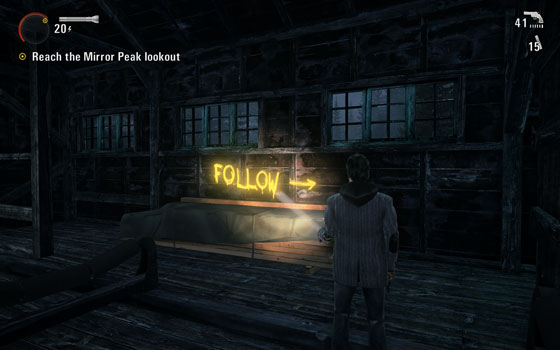Alan Wake is an intriguing game, in more ways than one. It tells the story of a writer fighting for his sanity against a mysterious ancient darkness. The PC version almost never saw the light of day either – after all that time in development limbo has it survived intact, or is it just another cheap console port? Here’s what I think…

The story is straight out of Stephen King. It’s a tale of horror, darkness and possession, then some other stuff about a typewriter and a lake. Or, you know, whatever. It certainly went on for a long time, I’ll give it that. The game is broken down into discrete episodes, which breaks the game up nicely, but by the end story feels far too drawn out, with all kinds of unfortunate mishaps artificially extending what should be a straightforward journey.
A cast of mostly forgettable characters is rounded off nicely by Alice, Wake's wife, who's particularly wooden; considering the bulk of the game is about rescuing her I found it surprisingly hard to care whether she lived or died.
The game takes place in and around Bright Falls, a generic small town on the edge of a lake somewhere in America. In daylight it’s nothing special, but when night falls the darkness changes the town and surrounding forests, mines and logging plants into gloomy, threatening places. The spooky, fog-shrouded woods are really well-crafted locations; all ominous shadows and figures and mysterious lights.

Alan Wake has a feeling of quality about it. Nice high quality textures and models make for attractive and realistic locations. The soundtrack – and audio in general – is excellent, too. Guns have a real punch, and the varied soundtrack does a great job at setting the mood, accompanying the bob and weave of your flashlight as you fight through another wave of the shadowy Taken.
The flashlight is one of the best things about Alan Wake. The beam serves as a target marker and does a great job of showing off the powerful lighting engine, but it’s also a core part of the combat mechanic: enemies are covered in a protective layer of darkness that you have to burn off with your flashlight before finishing them off with conventional weapons.
Light is your friend in Alan Wake – street lights are save points, a searchlight acts as a makeshift gun emplacement and a common-or-garden flare gun is the equivalent of a bazooka. It's good fun, and that's just as well considering it stays exactly the same throughout the whole game.
Alan Wake was originally a console-only game, and was only recently announced for PC. Remedy struggled to win Microsoft’s approval for a port, as summed up in a snarky QR code hidden in-game that decodes to: “Huh. Turns out this isn't too bad even if you're not sitting on a couch when you play it. Who knew!” As a port it’s actually pretty good: the interface has been revisited to suit keyboard and mouse, and the graphics have been improved to take advantage of the PC’s superior hardware.
But, like any good modern console game, Alan Wake is full of achievements and collectable odds and ends. Manuscript pages that gives glimpses into the lives and motivations of the cast are scattered through the game, and do actually add something to the experience. But there’s also stuff like thermos flasks of coffee, which serve absolutely no purpose except to make you purposefully go the wrong way in order to collect ‘em all.

I hate stupid time-wasting stuff like chasing after flasks of coffee, but the completionist in me can’t stop looking for them. Stopping in the middle of a frantic chase to make a detour for a glowing flask of achievement juice kind of ruins the moment for me, and it stretches out a game that could already do with being a third shorter.
I got the neutered version without the DLC, but both packs available sound very much like more of the same, which kind of sums up Alan Wake really. The first third was great – spooky, interesting, and fun. The second third was ok. The last third felt like a bit of a drag.
The light-and-shoot combo is satisfying… but not quite satisfying enough to sustain interest for hours and hours, especially considering the lack of variety in either weapons or enemies. Combined with slightly clunky movement and combat controls, combat that starts out as fun and exciting becomes an exercise in frustration by the end of the game.
I’d recommend it, overall, but do try to ignore your inner hoarder and stick to the core game – you’ll thank yourself for it by the time you reach the end.
VentureBeat's mission is to be a digital town square for technical decision-makers to gain knowledge about transformative enterprise technology and transact. Learn More
